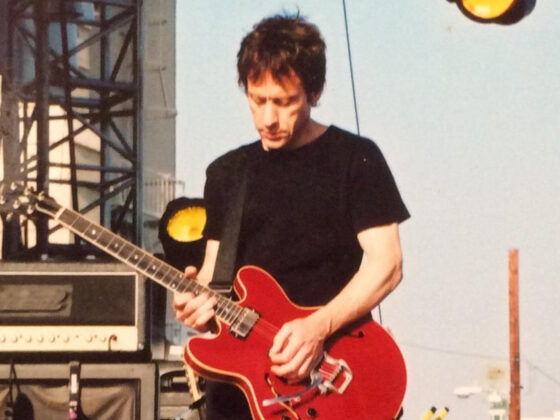Do we really need to drift apart
Be cast away or throw stones
Empathy seems to fade away
So much cruelty and nothing to say
In an era increasingly defined by divisive rhetoric and political disarray, French project The Memory Of Snow presents their World Cup EP as a timely meditation on the forces that both unite and separate us. Amidst ideological rifts and dehumanizing judgments that pervade our daily discourse, this collection of songs serves as both a critique and a call to action, urging listeners to reflect on the undercurrents of empathy and solidarity that are often overshadowed by conflict.
Incorporating elements reminiscent of Ultravox and Depeche Mode into the narrative of the EP’s title track World Cup, the arrangement takes a dramatic turn. The chorus, laced with a sardonic observation, ‘All it takes is a world cup or a terrorist attack to keep us together,’ is elevated by the stylish vocals, delivering each word with a potent mix of cynicism and intensity. This delivery is framed by pulsating, siren-like chiming synths (very reminiscent of Visage’s Fade to Grey), creating an immersive soundscape that amplifies the song’s thematic depth.
As the lyrics delve into the irony of our fleeting solidarity amidst global spectacles and shared tragedies, the synth-laden backdrop adds a haunting resonance to the message. ‘Do we really need to drift apart, be cast away, or throw stones? Empathy seems to fade away, so much cruelty and nothing to say.’ This verse, underscored by a growing chasm fueled by animosity and a decline in compassion, is punctuated by the dramatic interplay of art rock dynamics and enveloping synth textures, questioning the inevitability of divisions and calling for a resurgence of genuine unity and empathy.
Further emphasizing the call for a return to humanity, the song urges, ‘You can be a better being, open up your heart, look in the eyes of a stranger, we share the same soul.’ These words resonate as a powerful reminder of our shared human experience, challenging us to transcend the superficial divides that estrange us from one another.
This is followed by the old school late 70s synth-driven bit of biting social commentary, International, a scathing critique of the glamorous yet superficial lifestyle promoted by societal elites and influencers, from their high fashion and luxury accommodations to the allure of major cities worldwide. Despite the unattainable nature of these dreams for many, the seduction of such imagery often overshadows simpler joys in life, highlighting the pervasive influence of social media, consumerism, and globalized culture.
Medusa, with its ominous synth cinematics, and ardent vocals, explores pain, struggle, and the quest for retribution, addressing those who have suffered or felt marginalized. It suggests a growing resolve among the hurt and the overlooked to no longer remain passive, symbolized by the imagery of sharpened knives and drying out in the sun. This shift turns every interaction into a confrontation, with the protagonist becoming a ‘sweet destroyer,’ indicating that even in moments of closeness, there’s a readiness to defend or attack.
White Fire emerges as a new-wave rock anthem, brilliantly weaving existential quandaries and introspective journeys typical of the genre. It explores the tension between life’s urgency and the search for clarity, alongside the overwhelming nature of truth that diminishes our perceived significance. The song delves into themes of innocence versus temptation and the loss of mental clarity, set against a backdrop of global indifference. A looming transformative force prompts deep introspection and a reassessment of our desires. The narrative crescendos with a collective yearning for something beyond the tangible, a “meta-world,” encapsulating the human quest to transcend the mundane and uncover deeper meanings.
The first of two covers on the EP, The Memory of Snow’s take on the great k.d. lang’s If I Were You, puts a sauntering and contemplative darkwave twist on lang’s trademark twang, highlighting the ease and allure that come with being highly admired or popular, and fantasizing about the doors that such status would open. This yearning extends to a wish to trade places with someone else, believing that being in their position would grant access to unlimited possibilities and fulfillment of desires.
Build Me A House is a song that almost feels like that part of a concert, where the musician transitions to the piano with minimal guitar work and percussion like the stripped-down 70s-style rock Bowie was known to dabble in towards the end of his live tenure. The song oscillates between experiencing nature’s grandeur and deep love and battling despair and isolation. A longing for security and comfort emerges, symbolized by a plea for a protective “house.” Amidst turmoil, there’s a struggle for identity and belonging, encapsulating the universal quest for meaning in a chaotic world.
In their second cover, The Memory of Snow brings a somber and jazzy twist to “Pipeline” from Depeche Mode’s 1983 album, “Construction Time Again,” an album that interestingly takes its title from the lyrics of this track. Their rendition enriches the original’s exploration of themes such as hard work and time investment, and the idea of redistributing wealth to help those in need. The Memory of Snow’s version stands out by incorporating a melancholic blend of guitars, saxophone, and percolating synths, adding layers of depth and emotion.
The Memory of Snow’s World Cup EP is out now. Listen below, and order here.
Follow The Memory Of Snow:
















 Or via:
Or via: